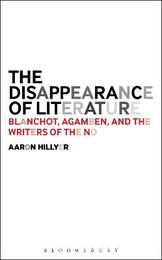
|
The Disappearance of Literature: Blanchot, Agamben, and the Writers of the No
Hardback
Main Details
| Title |
The Disappearance of Literature: Blanchot, Agamben, and the Writers of the No
|
| Authors and Contributors |
By (author) Dr. Aaron Hillyer
|
| Physical Properties |
|
| Category/Genre | Literary theory |
|---|
| ISBN/Barcode |
9781623561710
|
| Classifications | Dewey:809 |
|---|
| Audience | |
|---|
|
Publishing Details |
| Publisher |
Bloomsbury Publishing Plc
|
| Imprint |
Bloomsbury Academic USA
|
| Publication Date |
21 November 2013 |
| Publication Country |
United States
|
Description
In this book Aaron Hillyer considers the implications of Maurice Blanchot's strange formulation: "Literature is heading to its essence, which is its disappearance." This quest leads Hillyer to stage a dialogue between the works of Blanchot and Giorgio Agamben. Despite being primary points of reference for literary theory, no significant critical work has examined their "literary" writings together. The Disappearance of Literature initiates this new trajectory through readings of Blanchot's The Unavowable Community and Agamben's The Open, two short books that harbor their most enigmatic writings. A series of related concepts-study, community, mysticism, and friendship-emerges from this pairing, and, Hillyer argues, forms the basis of a new vein of contemporary literature found in the novels and hybrid fictions of Enrique Vila-Matas, Anne Carson, and Cesar Aira.
Author Biography
Aaron Hillyer received his Ph.D from the University of Nebraska in 2011.
ReviewsThe Disappearance of Literature is not only a thrilling addition to the growing body of work tracing the emergence of a literature of disappearance, but it also signals the birth of an important new critical voice. In recent years, few people have spoken about what escapes language with such extraordinary eloquence. -- Andrew Gallix * Times Literary Supplement * Provides insightful analysis of a number of important conversations that link Blanchot and Agamben-indirectly, through their separate engagement of writers like Georges Bataille, Walter Benjamin, and Franz Kafka, and, also indirectly, through Agamben's veiled communication with Blanchot himself. ... Hillyer's book offers some of its most compelling insights near the end, when literature becomes a means of reflecting upon the more general questions of ontology examined earlier in the book. ... The final, short chapters of Hillyer's book solidify the sense that his work takes a fresh angle on writers like Blanchot and Agamben who have rightly garnered the attention of many scholars and many books. Turning to the "writers of the no" gives his study that sense of freshness and demonstrates the relevance-perhaps the necessity-of Blanchot and Agamben's thought in the work of some of the most interesting, thought-provoking, and challenging writing in contemporary literature. -- Anne McConnell, West Virginia State University, USA * Comparative Literature Studies, Vol 15, No. 1, 2016 * In this book, Aaron Hillyer attends, with sensitivity and erudition, to the implications of one of the most startling paradoxes of literature: that its essence may be disappearance. Through a sequence of meditations on the vicissitudes of negativity, with Giorgio Agamben and Maurice Blanchot as his guides, Hillyer explores the divagations of writing in the non-works of Melville, Kafka, Cesar Aira, Anne Carson, Enrique Vila-Matas, and others. In doing so, he attempts to imagine 'a new human innocence.' -- Justin Clemens, Senior Lecturer in English, University of Melbourne, Australia The disappearance of literature is one of Maurice Blanchot's most provocative, paradoxical, yet affirmative propositions, one that binds the future of writing neither to modernist autonomy nor to oppositional negativity, but to an essential vanishing of all essentiality. In this probing new book, Aaron Hillyer expertly traces the faultlines of interpretation and misunderstanding between Blanchot and Agamben regarding literature's vocation, calling on a host of philosophical and fictional writings, from Bataille to Benjamin, Derrida to Duras, Cesar Aira to Anne Carson and Enrique Vila-Matas, in order to study, solicit, and survey the possibilities and impossibilities announced by literature's disappearance. -- Leslie Hill, Professor, Department of French Studies, University of Warwick, UK
|